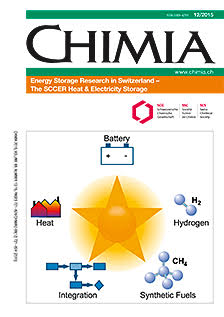CO2 Hydrogenation: Supported Nanoparticles vs. Immobilized Catalysts
DOI:
https://doi.org/10.2533/chimia.2015.759Keywords:
Co2, Heterogeneous catalysis, Hydrogenation, ImmobilizationAbstract
The conversion of CO2 to more valuable chemicals has been the focus of intense research over the past decades, and this field has become particularly important in view of the continuous increase of CO2 levels in our atmosphere and the need to find alternative ways to store excess energy into fuels. In this review we will discuss different strategies for CO2 conversion with heterogeneous and homogeneous catalysts. In addition, we will introduce some promising research concerning the immobilization of homogeneous catalysts on heterogeneous supports, as a hybrid of hetero- and homogeneous catalysts.Downloads
Published
2015-12-16
Issue
Section
Scientific Articles
License
Copyright (c) 2015 Swiss Chemical Society

This work is licensed under a Creative Commons Attribution-NonCommercial 4.0 International License.
How to Cite
[1]
Chimia 2015, 69, 759, DOI: 10.2533/chimia.2015.759.







